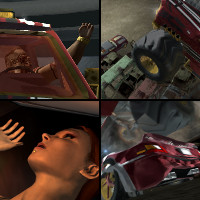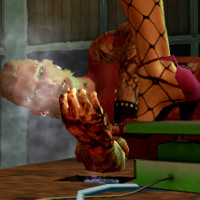I’d like to take a moment to discuss a game that does some really interesting things with character and storytelling: Volition’s GTA3-em-up, Saints Row 2. Wait, where are you going? I’m serious. Here’s the thing: SR2, more than any other game I’ve played, makes me despise my player character. By the end of the game, my PC is the most reprehensible person in Stilwater.
SR2 is a game that borrows liberally from Grand Theft Auto 3 and its successors. The player character is a sociopathic criminal, doing a series of missions to gain power in a city while murdering thousands of people in the process. Playing a game like this, the player should expect to do horrible things; it’s a game (in this case) about a street gang leader taking over an entire city. These games set up an environment in which the player can suspend their ethical disbelief. The world is farcical, with corrupt police, over-the-top raunchy radio ads, and stereotyped characters. All of the characters with dialog are criminals, and none of the bystanders get enough characterization to make the player empathize with them.
But there’s something weird in SR2‘s approach. The middle of the game consists of three parallel storylines, corresponding to the PC‘s strengthening of her gang, the Saints, through destruction of three rival gangs: the Sons of Samedi, the Ronin, and the Brotherhood. The Sons of Samedi plotline is a drug-running crime story in the Tarantino vein. The Ronin is a full-on action movie, complete with katana duels. But the Brotherhood is the brutal story of the cold-hearted destruction of a man and his family.
Maero is a giant, heavily-tattooed man who formed the Brotherhood out of truck-driving, metal-loving outcasts. At the beginning of the game, he is friendly to the PC, and offers her and the Saints a chance to split the city of Stilwater with the Brotherhood… 80/20. Despite the fact that she was in a coma for five years, the PC used to control all of Stilwater and considers this 20% an insult. For the rest of the story, the PC and Maero trade violent attacks, but it’s the PC who comes out as the most atrocious of the two.

After destroying some Brotherhood cars, the PC decides to go against Maero directly. She steals some radioactive waste and puts it in his tattoo ink. Maero prides himself on his tattoos, and at the end of this mission he is getting his facial tattoo completed. The radiation burns his skin from the inside, leaving him with an awful scar on one side of his face. This attack is so cruel and personal that it made me wince; I had just killed twenty virtual cops on my way to deliver the waste, but this was different. It was direct, and personal, and painful, and it was being done to a character honorable enough to offer a has-been a cut of the action.

In retribution, Maero has his men drag the PC’s homie Carlos behind their trucks for several minutes. By the time the PC finds him, Carlos is so badly hurt (though never shown on-screen) that she shoots him to end his suffering. As payback, she kidnaps Maero’s girlfriend Jessica. She puts Jessica in the trunk of her own personalized car and parks it at the end of a row of wrecks at a monster truck rally. Maero is driving the monster truck. The PC has arranged things so that Maero will unknowingly kill his own girlfriend to the cheers of thousands of spectators. Maero is so crushed that he is unable to strike back immediately.

Next, in order to get information on Maero’s plans, the PC invades a concert where the Brotherhood’s tattoo artist, Matt, is playing lead guitar. The PC beats and interrogates him, and learns that a shipment is coming in by boat. After she has already gotten all the information Matt knows, she holds his good hand over a pyrotechnic charge and ignites it, giving him horrible burns and ending his musical career.
The rest of the storyline is more standard: struggles for territory, thefts of weapons, and the eventual face-offs with Maero ending in his death. But these three scenes stick in my mind. I was under no illusions that my PC was a nice person, or even honorable. She’s a sociopath with a death count in the thousands, more interested in ruling a smoking ruin of a city than anything else. But these acts are so creatively reprehensible, so personal and visceral and cruel, that I’m no longer able to distance myself from her behavior. She is a bad person, probably the worst monster in the game, and I have helped her to rule the city.
The game has a hidden mission where the PC confronts Julius Little, founder of the Saints and the man who put her in a coma. He’s remorseful, and over the course of the mission the two are forced to fight side by side for their mutual survival. At the end, Julius seems to be trying to apologize, but the PC shoots him. As he bleeds, they speak. Julius calls the PC a sociopath, and the PC is unapologetic: it’s better to be in charge than to do as you’re told, he says. Julius laments the corruption of the Saints into a group of thugs. The PC shoots him in the head.
I can sympathize with GTA: Vice City‘s Tommy Vercetti, who comes from the Mafia and takes over the drug trade in a town. I can sympathize with San Andreas‘s CJ Johnson, as he cleans up his neighborhood with the iron fist of his gang and fights against cops on the take. I can’t sympathize with my SR2 PC. She is a horrible person, and I helped her gain control of Stilwater. I hope she gets what’s coming to her someday.
I felt the same way during alot of the game, hated the julius part.
I actually really dug Julius’ speech to the player before he’s killed. Probably because every single thing he’s saying to and about your player character is 100% accurate. The whole “Would you have walked away?” “Fuck no, this is MY city.” “You haven’t learned a goddamn thing” bit is great because it’s an incredibly acute summary of how far off the deep end your character has gone.
Great write-up, man!
I agree about Julius; I haven’t played the first game, but it seems like he is the classic gang leader who’s really trying to clean up the trash and support his community through any means necessary. The PC, though, is just a rabid thug, and Julius clearly recognizes that. Unfortunately, he realizes it a bit too late.
The burning the hand bit sounds like more than ending a musical career. You said he is the gang’s main tattoo artist, is the rest of the gang like their leader? If so then you are destroying the gang’s ability to mark (and thus distinguish) their members, weakening them as an organization.
Also the bit with the girl friend makes you sound less like a rabid thug and more cold, calculating, and with a sense for the dramatic.
Yes, the whole gang is heavily tattooed, so burning his hand is worse than I had realized… although I’m bothered more by the personal implications (even members of your own gang admit that he has a great band) than by the organizational ones.
The PC is presented much more as a spontaneous genius for mayhem than as a cold, calculating planner. At the beginning of most missions, she’s like, “Screw it, let’s go do (audacious act),” and that’s all the lead-up there is. In fact, at one point a gang member wants to pull off a carefully planned heist, and instead the PC announces that they’re going to charge in the front door, guns blazing.